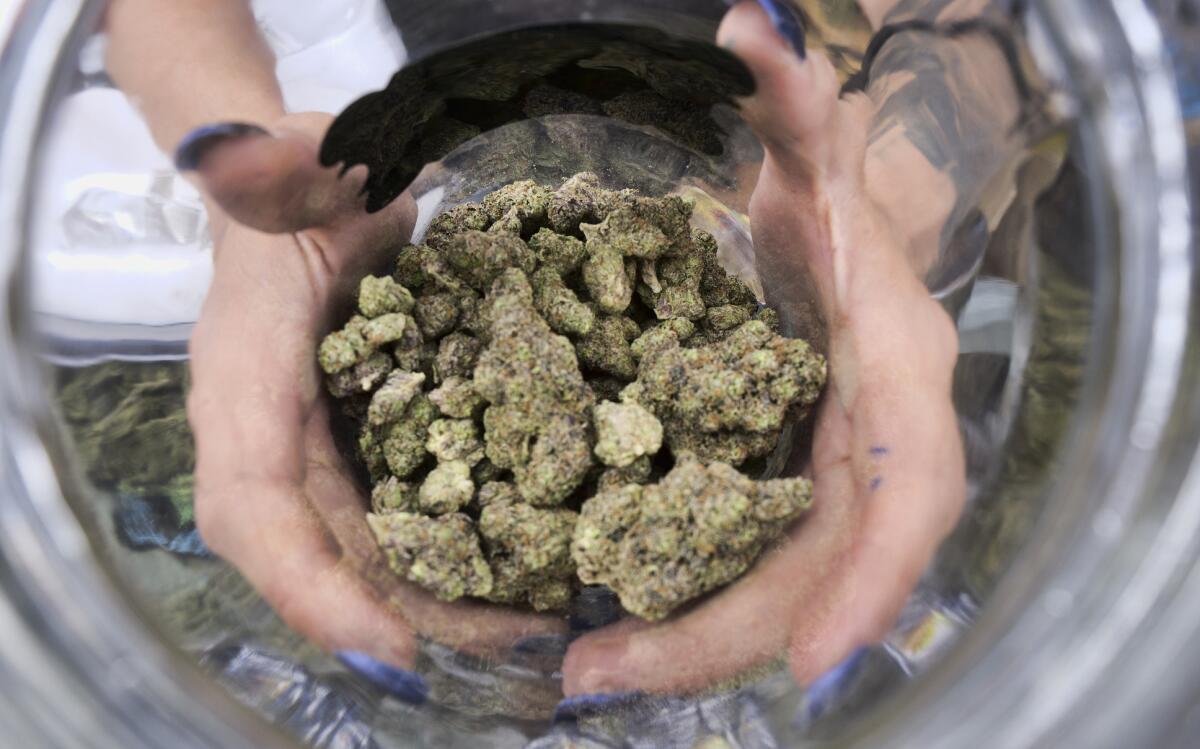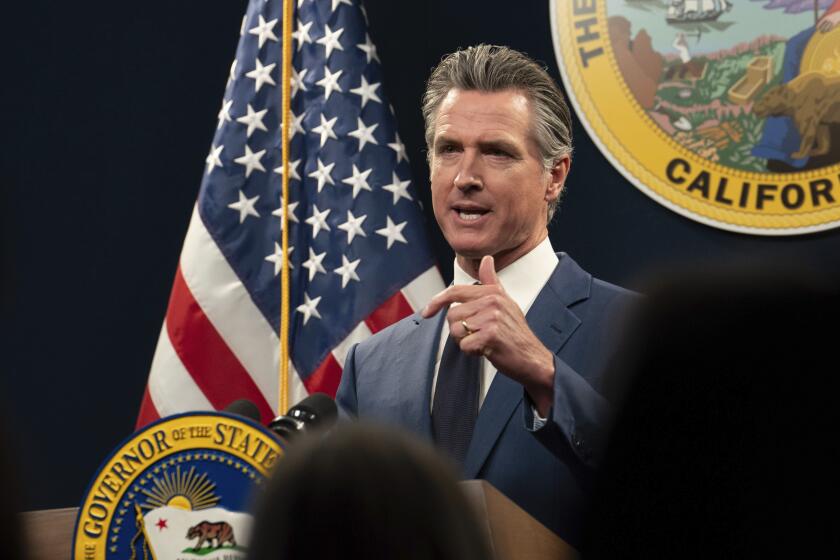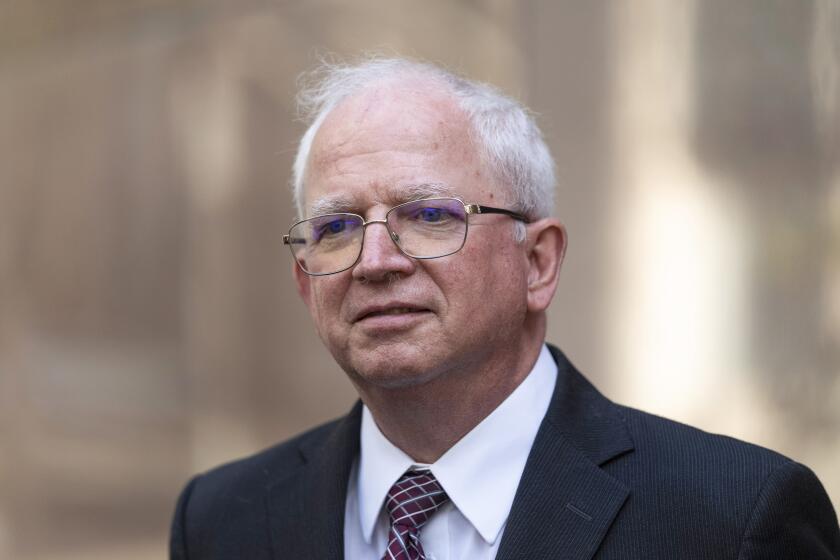Biden’s big move on marijuana: Will voters give him credit?

For the past decade, a huge gap has separated the marijuana policies Americans want from the ones the federal government enforces.
Few issues exist on which the gap has been wider and more consistent.
The Biden administration soon will take a big step toward bringing federal policy on weed more in line with what the public says it prefers. That’s the way democracy is supposed to work: In politics as in show business, “give the people what they want” is a pretty reliable guide to success.
You're reading the L.A. Times Politics newsletter
Anita Chabria and David Lauter bring insights into legislation, politics and policy from California and beyond. In your inbox three times per week.
You may occasionally receive promotional content from the Los Angeles Times.
There’s little doubt the change will be popular: Polls show that roughly 70% of Americans favor making marijuana legal. Even limited steps, such as the ones President Biden can take through executive action, get highly favorable ratings.
How much political boost Biden will receive from the new policy, however, remains uncertain. The big question: Will voters pay attention?
What Biden plans to do

A year and a half ago, Biden directed the Department of Health and Human Services to review how federal law deals with marijuana.
Biden’s order began a long process of changing rules that were put in place more than half a century ago, during the Nixon administration.
Ever since the nation’s largely futile “war on drugs” began, marijuana has been included on what is known as Schedule I of the government’s list of controlled substances. Schedule I drugs “have no currently accepted medical use in the United States, a lack of accepted safety for use under medical supervision, and a high potential for abuse,” according to the Drug Enforcement Administration.
In August, Health and Human Services recommended to the DEA that marijuana be moved to Schedule III, a set of drugs that have some medical uses but “may lead to moderate or low physical dependence or high psychological dependence.” Ketamine and some anabolic steroids are examples of drugs currently on Schedule III.
After months of additional review, DEA signed off on the change. This week, Atty. Gen. Merrick Garland, whose department includes the DEA, officially submitted the plan to the White House, administration officials confirmed to the Associated Press and other news organizations.
The plan to reschedule marijuana must still be reviewed by the White House’s Office of Management and Budget and then will be open for public comment before becoming final later this year.
Historic, but limited
The administration’s move is “historic,” but at the same time is “more messaging than it is policy,” said John Hudak, director of the state of Maine’s Office of Cannabis Policy and a former scholar at Washington’s Brookings Institution.
“Biden is doing something that no president has been willing to do in the 54 years since marijuana was scheduled,” Hudak said. “When you think of it in terms of the arc of history,” it’s a big move, especially considering that as a senator, Biden ardently supported anti-drug policies during the 1980s and 1990s, he said.
Rescheduling marijuana, however, does not mean legalization — a step that would require Congress to change federal law. Some pro-marijuana activists have criticized Biden’s move as too limited.
Thirty-eight states and the District of Columbia allow use of marijuana; 24 allow recreational use. But unless Congress acts, those state laws remain in conflict with federal law, complicating things like interstate shipment of cannabis and banking regulation.
Consumers — and more importantly, voters — are likely to welcome the relaxed federal policy even if the changes have limited effect.
Marijuana is “more popular than any of the guys running for president,” Hudak noted.
But “the particular policy impacts are mostly lost” on most voters, he added.
The practical impact
Where the move will have a tangible effect likely will be in two areas: research and taxes.
Research on Schedule I drugs is extremely complicated and expensive because of complex rules designed to prevent illegal drugs from being diverted. For years, such restrictions have hampered studies of the potential medical uses.
Moving marijuana to Schedule III will make research far more feasible.
For dispensaries and other firms in the multibillion-dollar marijuana industry, Schedule I has meant much higher costs: The Internal Revenue Service does not allow ordinary business-expense deductions for income from the sale of Schedule I drugs because such sales are illegal under federal law.
Once marijuana moves to Schedule III, the IRS is expected to allow those deductions as it would for other businesses. That could mean significant profits for pot businesses.
In an earlier era, rescheduling of marijuana would have had an effect on federal prosecutions for pot; those seldom happen anymore.
A report last year from the U.S. Sentencing Commission found that federal prosecutions for simple possession of marijuana fell from 2,172 in fiscal year 2014 to just 145 in fiscal year 2021. In recent months, the Justice Department has dropped some long-running prosecutions that dated from an earlier era of enforcement.
The public’s view
Back when President Nixon proposed what became the Controlled Substances Act, just 12% of American adults supported legal marijuana, according to Gallup’s long-running polling on the question.
Support roughly doubled by the time Jimmy Carter took office in 1977, then plateaued for about 20 years.
In the mid-1990s, public opinion began a steady shift, partly because of an older generation passing from the scene, but also because of people changing their minds.
Between 1995 and 2011, support for legal weed doubled from one-quarter of U.S. adults to one-half. From there, support continued to grow, leveling off at around 70% of the adult population in recent years.
That broad agreement, however, hides some major fissures. Marijuana legalization unites Democrats, but divides Republicans, according to a January survey by the Pew Research Center.
More than 90% of Democrats and Democratic-leaning independents support legalization at least for medical use, with more than 70% supporting legalization for recreational use, Pew found. Only 5% oppose legalization entirely.
Among Republicans, however, just 42% support recreational use of marijuana and about 20% oppose any legalization.
Opposition to legal marijuana is especially strong among conservative Republicans and older GOP voters, Pew found. Partly because those constituents hold sway in GOP primaries, the party’s elected officials, especially at the federal level, tend to be more opposed to marijuana than the party’s voters.
During former President Trump’s administration, for example, his Justice Department appointees toughened rules against marijuana. At one point, they threatened to begin prosecuting marijuana users in California and other states where it is legal until Trump told them to back off. The former president has said little about marijuana in the current campaign.
Will it help Biden?
Embracing policies that unite your side and divide the opposition tends to be a good move in politics.
In this case, the move has particular appeal to some groups of great interest to Biden’s campaign. Those include young men, Black men and Democratic-leaning voters who have been considering independent or third-party candidates, said Celinda Lake, a longtime Democratic pollster who has surveyed opinion for the Coalition for Cannabis Scheduling Reform, an industry group.
Young men have moved away from the Democrats in recent years, according to twice-a-year surveys of young Americans done by Harvard’s Institute of Politics. Winning them back could be a major factor in Biden’s ability to win reelection.
Voters who are flirting with third parties or with not voting at all “are frustrated and alienated,” Lake said. “They’re sick of policy being made by people who don’t understand them or their issues.”
The moves on marijuana respond directly to something personal in their lives, she said. “It’s not an esoteric issue.”
The message it sends about Biden is that “his attitudes are up-to-date, that he’s modern, that he’s not too old to get it,” she said.
That only works, however, if potential voters know that something has happened, she noted. “It takes education,” she said. “There needs to be a concentrated digital campaign” to connect with those voters, many of whom don’t pay attention to traditional news sources.
That’s a struggle this administration faces on many of its policies, quite a few of which poll better than the president who pushed them.
Giving the people what they want remains a good plan, but these days, making sure they know you’ve done so is an equally important challenge.
WHAT ELSE YOU SHOULD BE READING
This week’s must read: The U.S. is experiencing a surge in the number of new businesses, and the racial gap in business ownership is shrinking.
2 polls of the week: Support for banning abortions in all cases has dropped to 9% of the U.S. population; 64% say abortions should be legal all or most of the time.
Does the U.S. look different from the West? A new poll from the Independent Center surveys residents of the five Pacific Coast states.
The L.A. Times special: Lauren Boebert is her own best asset — and worst enemy — as she fights to stay in Congress, Mark Barabak writes.
Was this newsletter forwarded to you? Sign up here to get it in your inbox.
Get the L.A. Times Politics newsletter
Deeply reported insights into legislation, politics and policy from Sacramento, Washington and beyond. In your inbox three times per week.
You may occasionally receive promotional content from the Los Angeles Times.




